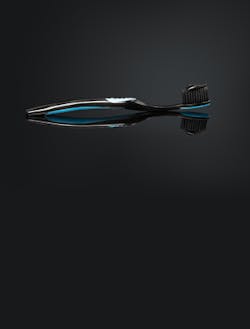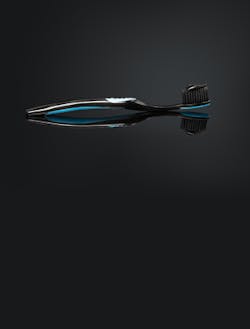Activated charcoal: An all-natural tooth whitener?
By Bethany Ley, BSDH, Kayla Kendrick, BSDH, Amy Coplen, MS, EPDH, RDH
Patient: “I just heard the best idea! I am going to use charcoal to whiten my teeth.”
Hygienist: “OK, that’s enough nitrous for today!”
If you haven’t had a patient ask you about activated charcoal, you will. Yes, the same product we think of for our July barbecues is now used as a natural tooth whitening agent. “Activated” means the charcoal is reheated and purified to enhance its natural adsorptive abilities. Activated charcoal is used as a finely ground, odorless, and tasteless black powder that, in theory, will adhere to extrinsic stain to result in whiter teeth.1 As dental professionals, we must be knowledgeable about this potential breakthrough product and its effects on patients’ oral health.
Activated charcoal is the new fad in the natural health market. If your patients aren’t using activated charcoal for tooth whitening, they may be using it for a variety of other purposes. Today it is also seen in detox smoothies, supplements, water purifiers, and skin care products, such as soaps, face masks, and exfoliators. Now that it has reached the tooth whitening market, manufacturers are marketing more than ever.
The US tooth whitening product industry is expected to be worth $7.4 billion by 2024.2 Consumers are interested in having white teeth and see marketing for whitening nearly every day. Most activated charcoal products are now advertised successfully solely by social media. The target population seems to be young women, anyone who prefers an all-natural tooth whitening method, or anyone who might want a cost-effective alternative to conventional whitening.
Short video commercials on social media sites such as Instagram, Facebook, and Pinterest advertise by showing women with ideal smiles using activated charcoal and praising the drastic results. Most of these videos are posted on the blogs or personal accounts of millennial influencers, which will be seen by hundreds of thousands of consumers. Videos often include before and after snapshots for “proof” of the results and safety and make a variety of claims to entice buyers.
A recent literature review by dental professionals compared advertising claims of 50 different activated charcoal–based dental products. The number one claim was—you guessed it—whitening. However, nearly half of the products also claim to have therapeutic benefits, such as detoxification, antibacterial qualities, remineralization, or strengthening the teeth. Other intriguing claims, such as organic, natural, ecofriendly, or pure, appeared in 88% of product descriptions. Out of these 50 products, most listed ingredients, but only four contained fluoride.1
Below is a brief overview of some products on the market, including cost, customer reviews, and claims made by sellers.
Product listing title: Active Wow
Seller and price: Amazon, $24.79
Number of reviews and stars: Nearly 17,000 reviews, 4.5 stars
Product description: “Whiten with no sensitivity - premium ingredients, excellent for gum health - Refined charcoal powder from the purest sources”i
Product listing title: Lush Toothy Tabs, Boom Dental Dynamite
Seller and price: Lush, $10.95
Number of reviews and stars: 111 reviews, 4.5 stars
Product description: “For a smile with a blast radius, brush with Boom! These dark little tabs are packed with detoxifying ingredients like powdered charcoal and gunpowder tea to keep your kisser in tip top condition.”ii
Product listing title: Hardwood Activated Charcoal Powder 100 Percent from USA Trees 8 oz. All Natural. Whitens Teeth.
Seller and price: Amazon, $12.99
Number of reviews and stars: More than 2,000 reviews, 4.5 stars
Product description: “CLEAN AND WHITEN YOUR TEETH the all natural way.”i
Product listing title: Organic Activated charcoal capsules – 600 mg
Seller and price: Amazon, $13.95
Number of reviews and stars: 155 reviews, 4.5 stars
Product description: “The ingredient is also used as activated charcoal toothpaste and as an activated charcoal teeth whitener - simply brush your teeth with it, you’ll be amazed at what it can do!”i
Product listing title: Tuxedo Activated Charcoal Powder, All Natural Tooth Whitener with Coconut Charcoal and Bentonite Clay, Highest Quality Non Abrasive Safe on Enamel (Mint)
Seller and price: Amazon, $23.72
Number of reviews and stars: More than 2,000 reviews, 4 stars
Product description: “Our formula is gentle on enamel, and promotes healthy teeth, TUXEDO GENTLY WHITENS OVER TIME: Our natural whitening formula gently removes stains from coffee, wine, etc., to reveal whiter, brighter teeth. Use daily for 30 days to see results. This product does NOT bleach teeth with chemicals.”i
Product listing title: Colgate Total Charcoal Deep Clean Toothpaste
Seller and price: Amazon, $6.95
Number of reviews and stars: 52 reviews, 3.5 stars
Product description:“Effectively fights germ build up for a Superior Deep Clean”i
Product listing title: Curaprox Black Is White Toothpaste Set Charcoal Whitening Toothpaste/Toothbrush
Seller and price: Amazon, $25.59
Number of reviews and stars: 124 reviews, 4 stars
Product description: “SAFE & GENTLE: Free of SLS, triclosan, bleaching agents, and plastic particles, Black is White Toothpaste is great for sensitive teeth and oral health. ENAMEL FRIENDLY: Black is White Toothpaste works to give you a healthy while smile and double protection against tooth decay, while protecting your enamel and gum tissue as a main priority.”iii
Based on outstanding positive consumer reviews and popularity, it’s safe to say it probably works. In theory, activated charcoal should adsorb and remove surface stain on teeth. However, if a patient is suffering from intrinsic stain, activated charcoal would be ineffective.
The most common complaint we found was about the messiness of the powder on the sink or counter, although it does not stain. A few other comments were posted about sensitivity resulting from use of the product, the lack of desired results, and getting the product stuck under the gingiva.
Activated charcoal may be found in a variety of forms, including a loose powder, tablets, or a paste. When using the powder or tablet form, consumers are instructed to open the tablet or powder container and dip a dampened toothbrush in the finely ground powder. Then they are instructed to brush the teeth gently for one to two minutes once or twice daily, depending on desired results. Rinsing, or sometimes even the use of conventional toothpaste, is often recommended afterward to remove residue. The powder and tablet forms are nearly, if not completely, 100% activated charcoal. These substances may be harsher on enamel than products containing lesser amounts of activated charcoal, such as pastes or gels.
As far as safety is concerned, activated charcoal is safe to ingest. The adsorptive power of activated charcoal has been used for hundreds of years as an antidote for acute poisoning in conjunction with gastric emptying. Because it is so porous, it binds to toxins, preventing absorption in the stomach. There have been no reports of adverse reactions, other than the onset of vomiting. The quality of adhesion and the chemical process have been studied well, but no long-term studies have been conducted specifically to examine its effects in the oral cavity.
Currently, there is no appropriate or substantial evidence to prove the safety and efficacy of activated charcoal as a whitening agent. This lack of research may be why Colgate is the only well-recognized toothpaste brand that has a formula containing activated charcoal on the market.
The Journal of Physics recently published an experimental study comparing the effects of three different dentifrices on the enamel of extracted teeth: distilled water, a conventional formula, and a formula containing activated charcoal. This study reported the charcoal dentifrice caused significantly more enamel roughness than the other two dentifrices.3
Although we cannot be certain of the effects in the oral cavity, there is enough reason to raise suspicion of abrasiveness. We know that if it is too harsh on enamel, it can lead to abrasion, plaque retention, sensitivity, and ultimately more staining. Patients who are not exposed to fluoride, present with generalized recession, or have intrinsic stain should not consider activated charcoal products until further research is conducted.
When discussing the use of activated charcoal with our patients, we must warn them of false advertising and explain the possible negative side effects. It is important to advise against replacing conventional toothpaste and to recommend limiting use of these products. We can also recommend that patients use the lowest charcoal-containing formula possible, such as certain pastes instead of pure powder forms.
Moving forward, we hope to see increased research to better understand activated charcoal products so that we can confidently advise our patients on their effectiveness. We hope readers now understand the benefits and drawbacks of activated charcoal and feel better equipped to discuss this topic with patients who bring it up. Hygienists should be aware of the growing craze and advertising boom of the activated charcoal industry and encourage patients to use whitening methods that have been proven safe and effective.
Notes
i. Product information quoted from amazon.com listing on April 2, 2018.
ii. Product information quoted from lush.com listing on April 7, 2018.
iii. Product information quoted from amazon.com listing on July 8, 2018.
References
1. Brooks JK, Bashirelahi N, Reynolds MA. Charcoal and charcoal-based dentifrices: A literature review. J Am Dent Assoc. 2017;148(9):661-670.
2. Teeth Whitening Products Market Size Worth USD 7.40 Billion by 2024: Hexa Research [news release]. Felton, CA: Hexa Research; September 20, 2017. https://www.prnewswire.com/news-releases/teeth-whitening-products-market-size-worth-usd-740-billion-by-2024-hexa-research-645998863.html. Accessed April 8, 2018.
3. Pertiwi UI, Eriwati YK, Irawan B. Surface changes of enamel after brushing with charcoal toothpaste. J Phys Conf Ser. 884(2017):012002.
Bethany Ley, BSDH, graduated in 2018 from the School of Dental Hygiene Studies at Pacific University in Hillsboro, Oregon.
Kayla Kendrick, BSDH, graduated in 2018 from the School of Dental Hygiene Studies at Pacific University in Hillsboro, Oregon.
Amy Coplen, MS, EPDH, RDH, is an associate professor and associate dean for interprofessional education at Pacific University, College of Health Professions.

